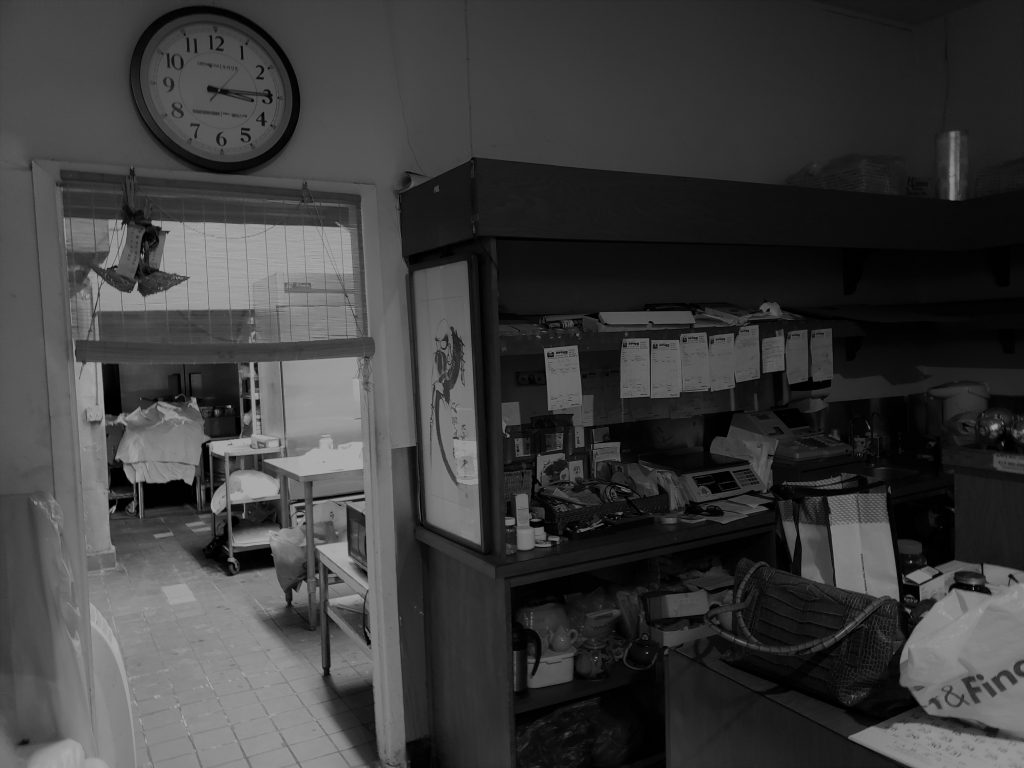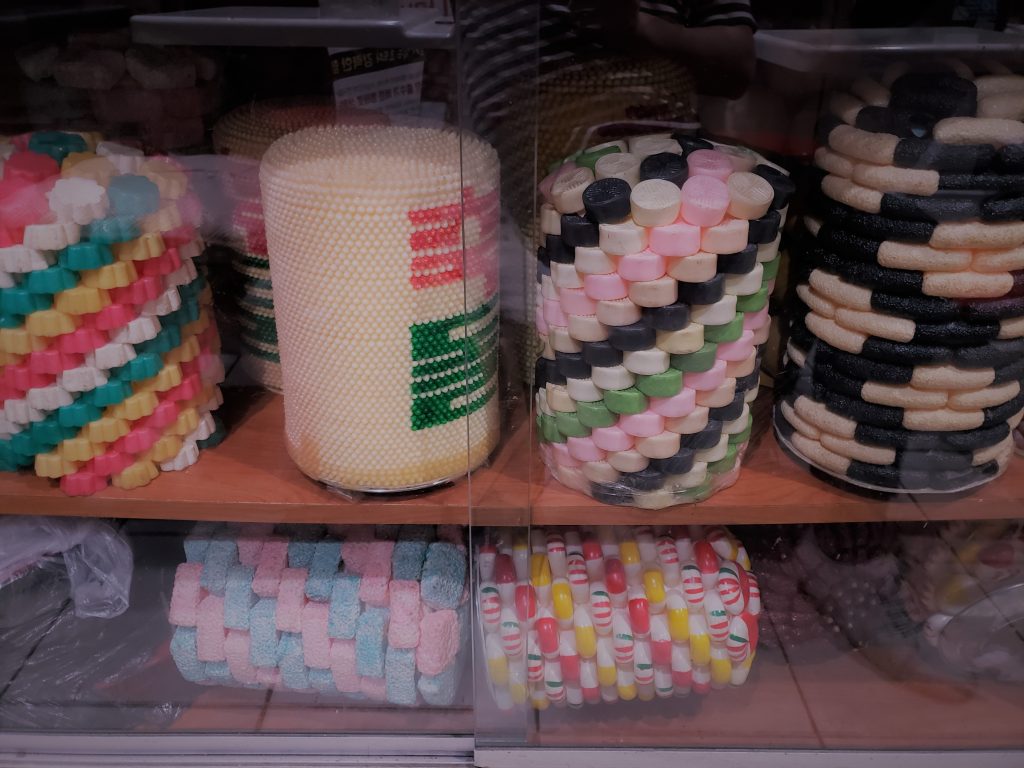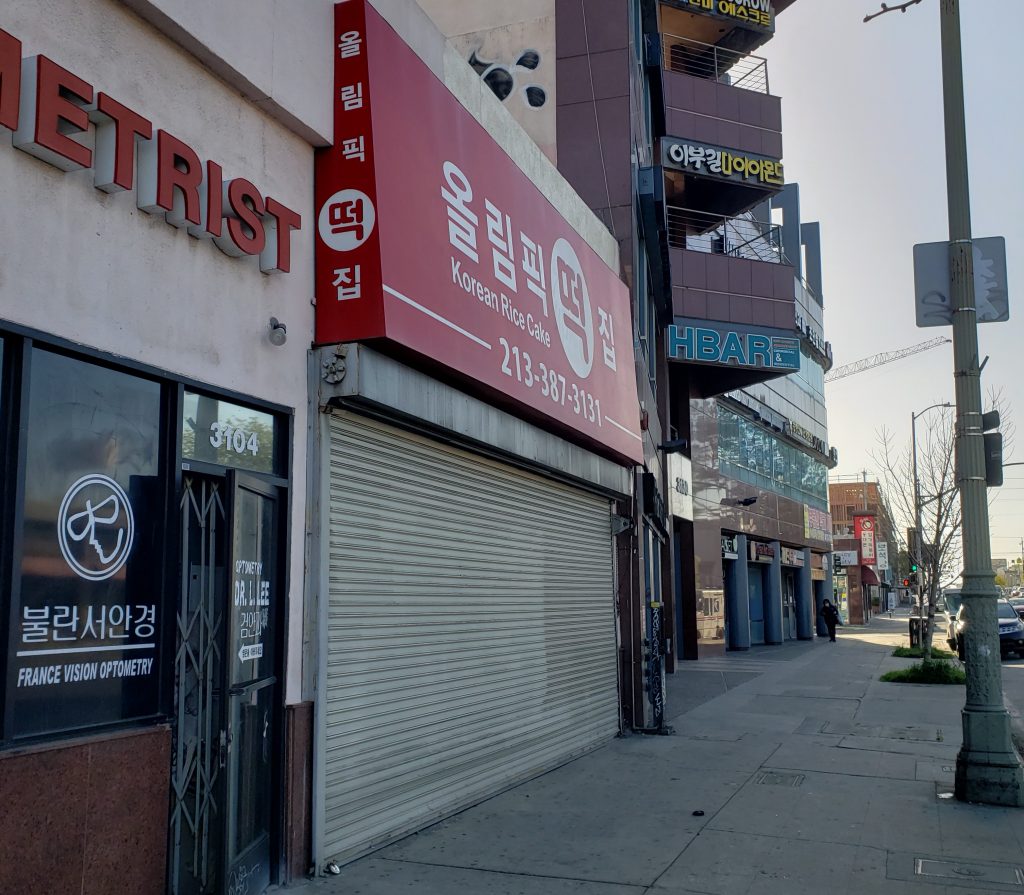How COVID-19 is shutting down historic Koreatown businesses in Los Angeles
Olympic Rice Cake Shop has been in business for four decades on Olympic Boulevard in Los Angeles’ Koreatown.
Now, after a year of financial hardship due to COVID-19, the bakery and deli might be closing down for good, much like a number of other Koreatown shops that have been in business for decades.
The Olympic Rice Cake shop is still technically in business – albeit with minimum capacity. The shutters have been down for just over a year. The kitchen lights are turned off. No white steam is puffing out from the rice cake machines. No pungent smell of sesame oil glazes. No phones ringing with customers calling for orders.
As a matter of fact, there have been no workers here for more than a year.

“We had to let go of our bakers in March last year,” says Angela Lee, the second-generation owner of Olympic Rice Cake Bakery. She is the only one who works in the store; her former manager comes in once every week to keep her company and help out with the occasional orders. “We don’t have orders for days, no, weeks,” says Lee. “It made no sense to keep our workers, even as early as last March.”
Lee took over the business from Byung-Moon Lee and Han-Soon Lee in 1989, who were the first owners of the rice cake shop. They named the shop “Olympic” after the 1934 Los Angeles Olympics, said Lee.
“Olympic Rice Cake Shop was one of the first businesses in Koreatown to operate with “Olympic” in their store names,” said Lee. “Generations of customers have come by. When the first generation of customers got married, they ordered rice cake from here. And their sons and daughters would come here from their marriage. And they would come here for their baby showers, and so on.”
You can’t find it anywhere else, even back in Korea
Koreatown, a neighborhood in central Los Angeles, has a population of 124,281 according to the most recent estimate by L.A’s Department of City Planning. Over one fifth (21.2%) of the residents have Korean ancestry, just below those with Mexican ancestry (22.4%). For the foreign-born residents of Koreatown, who make up over three-fourths of the population, Korea is the most common country of birth.
The neighborhood, particularly Olympic Boulevard, has been home to a number of historically significant Korean immigrant-owned businesses. Sometimes called “No-Po” (Literally Old Store in Korean), these businesses have been community hubs for many generations of Korean Americans, as well as cultural icons that preserve a Korean immigrant culture that is unique to Los Angeles. For example, just across the street from Olympic Rice Cake Shop is Kim Bang-Ah, another Korean rice cake shop and mill that was a part of the Koreatown Walking Tour of the Los Angeles Conservancy. It, too, however, has closed down its business for good.
“Even I don’t have it bad,” said Lee, who is well-connected with other Korean business owners in the neighborhood. “You should really see how empty Korean-owned hotels and travelling agencies are. At least I have orders from time to time…they have been literally empty for a year. No income, but still paying for all that maintenance.”
But, like hotels and travelling agencies, Lee’s bakery had also relied on seasonal customers that disappeared with the pandemic. Korean rice cakes, or ddeok (떡), are an essential part of traditional Korean celebrations. They are offered during baby showers, Jesa (Korean Ancestral Memorial Ceremony, similar to Mexican Ofrendas), and Gosa (Korean ceremony of wishing luck and purging of evil spirits). In fact, traditional small-scale Korean rice cake shops like Lee’s rely almost entirely on such large communal celebrations and catering, and the rice cakes are made in large batches to-order. But without walk-in purchases and no partnerships with Korean grocery chains, it became a problem for her business when the pandemic hit and all indoor gatherings were banned in Los Angeles.

“Mid-Autumn Festivals and Spring Festivals are usually our biggest earning seasons. But with the pandemic, there were no big gatherings. There were no customers who would come by to pick up their order before heading back home for the holiday seasons,” said Lee.
Old-school like Lee’s or not, Korean rice cake shops are mostly concentrated in Koreatown, with a few in Orange County, which has the second biggest population of Koreans in the U.S. Most of them supply their products to large Korean grocery stores throughout the city, and that remains their main sources of income. But Lee’s business never worked with these grocery stores, because she could rely on her regular customers.
Lee said there are still the occasional regular customers who put in personal orders, often old-timers who freeze them in big batches for snacking. But without a steady stream of income, she is paying for the shop’s fixed expenditures purely from her personal savings – money that she has been saving up for her upcoming retirement in the near future.
Lee’s decision to retire is not unusual among other Koreatown business owners, who have decided that the intensive workload of maintaining a restaurant was not paying off. The pandemic has forced many first-generation Korean immigrants, who painstakingly maintained the traditional Korean way of operating their business, to finally compromise with their old age and physical strain.
“These older people, they don’t like to retire. That’s just how they were grown. So I think this pandemic helps some of these people to learn how to retire,” says Alice Han, co-founder of Mama Los Angeles, a mutual aid organization that promotes and partners with financially struggling immigrant businesses in Los Angeles. One of their most popular partnerships was with Jun Won, a widely popular Korean family-style restaurant that had been open on Western Boulevard of Koreatown since 1994, which shut its doors permanently last July due to the pandemic.
Mama Los Angeles collaborated with Jun Won to have a final sale and sold out all of its orders – a final farewell and recognition of owner Jung Ye Jun, who operated the restaurant with her son Jeff Jun, who said, “She has been working for too long now… and used to come into the kitchen every single day. It was time for her to realize ‘It’s time to go.’”
Below is Mama Los Angeles’ Instagram, promoting their most recent one-day reopening event for Beverly Soon Tofu:
Koreatown has been changing, even before COVID-19
Much like Jun, Lee too is now ready to hand over the business to two new immigrants from Korea, who will take over when they arrive in Los Angeles.
“They’re in Chicago right now under quarantine,” said Lee. “But when they take over, I don’t know if they’ll still operate on Olympic (Boulevard) anymore. Frankly, with the way real estate prices are going up, I’m not sure if they can ever cover the cost of doing business here.”
“The Coronavirus pandemic has only amplified the pre-existing problems that our small business owners have been facing,” said David Yung Ho Kim, who ran against and lost to incumbent Democrat Jimmy Gomez for Congressional District 34 of California in November, and is currently an immigrant litigation attorney. “Most of these businesses lost at least 50 percent in sales — 50 to 80, 90 percent in sales,” he said.
According to Kim, the financial hardships of the pandemic shutdown have forced many store owners to finally give into the rising cost of doing business in steadily gentrifying neighborhoods such as Koreatown. Koreatown’s home values went up 1.4% between January 2020 and 2021, according to Zillow. There were 51 new construction projects scheduled in Koreatown, according to a Curbed Los Angeles report in 2018. This gentrification happened even as the median income of Koreatown residents ranks 251st out of the 265 neighborhoods in Los Angeles, according to the Los Angeles Times’ Mapping LA project.
Koreatown is still a much-sought after neighborhood for property owners, who are ramping up rent even during the pandemic. “Three or four days ago, I received a call from my landlord, who said they will renew our contract if we settle the rent on $6,000. We have been paying $3,500,” said Lee. “There is no way the new owners will be able to do business here, with the way things are going.”

Kim said that is why his campaign launched a series of community “Mukbangs,” a form of video live streams that originated in Korea, showing the host eating a large amount of food He partnered with local Los Angeles eateries to promote awareness of their financial hardships during the quarantine.
“And so there was an effort in getting to know these businesses, talking with them, seeing what their struggles were, seeing if they were able to apply for and get cheap loans, which a majority of them were not able to because they didn’t have preexisting relationships with SBA-approved lenders,” said Kim.
One of the restaurants featured on the Mukbangs was Yellow House Café, a Korean-style diner on 3rd Street and Olympic Boulevard, on the edge of Koreatown. Kim realized that café owners were “deliberately” laying off their longtime employees, so they could get paid more from government benefits instead of their current low-wage jobs.
“So for the (business’) employees to actually get laid off and receive unemployment benefits, that was much more beneficial to the employees because they’re able to get bigger pay than perhaps what they might have received as the original pay in a way,” said Kim.
The employees may get a better deal by receiving unemployment benefits, but businesses might be hurting themselves in the long road. “In order to get a loan, you need to hire employees back. But to hire your employees back means that the employees themselves will end up getting less money (because their wage will be lower than their unemployment benefits),” Yung Ho Kim said.
Businesses that aren’t operating at their expected capacity are ineligible for PPP loans, which “provides loans to help businesses keep their workforce employed during the Coronavirus crisis,” according to the U.S. Small Business Administration.
How the pandemic pushed away the Old Guards of Koreatown
But according to organizers who have collaborated with these Koreatown “No-Pos,” it’s not just a matter of balancing labor costs. Many of these businesses still operate with a traditional mindset — where employees are family, and customers, many of them old-time regulars, almost always discover them via word-of-mouth.
“A lot of these restaurants – mom-and-pop, immigrant-owned restaurants, they don’t have the capacity to work with (food delivery apps) or they weren’t set up already with them,” said Jared Jue, the other co-founder of Mama Los Angeles. “They’re also not business-savvy in terms of marketing and working with social media and getting their name out and working with influencers (to promote their business during quarantine).” For example, Mama Los Angeles has been organizing massive food deliveries via their Instagram account, which has over 6,000 followers.
But other businesses were a lot less receptive to collaborating with a younger generation of Korean American organizers, said Kim. Having relied on old-time customers and phone orders for decades, they were unwilling to work with start-ups that could connect them to online delivery services or attract new customers via social media.
“Take the case of Hodori and Nak Won. We reached out to Nak Won, but even trying to explain ‘Community Mukbang’ to whoever the manager was, they didn’t get at it. They thought we were mooching off of them,” Kim said. Hodori and Nak Won were two beloved Koreatown diners side-by-side on Vermont Avenue, well-known for their 24-hour operations and prime location in the neighborhood. Only Hodori, which was registered on food delivery apps even prior to the pandemic, remains in business.
Below is an interactive map showing the locations and availability of all the Koreatown businesses mentioned in this story:
Olympic Rice Cake Shop is also reluctant to adopt new business strategies. Ever since the rice cake shop was founded in 1974, the business model has always been made-to-order. “This is different from other rice cake shops that supply their cakes to the big Koreatown grocers – like Galleria, like Hannam Market, and have to make their cakes the day before,” Lee said proudly. “This way, our customers could always have their rice cakes freshly out of the steamer.”
She has no plans to change the business to a more walk-in friendly bakery that attracts new customers who are passing by or registering the shop on online food delivery apps. Lee claims that since the business’s founding, it has always appealed to an older, more family-oriented clientele.
“If Kim Bang Ah was for milling chili powder and purchasing various grains, our store has been a deli for Korean old-timers who craved certain traditional dishes. We have never opened our store for walk-in purchases,” Lee said.
When asked about bringing back employees, Lee’s reply was simple: “I had no interest in applying for PPP loans, because I have no intention of keeping the business.”
Historically, Korean businesses in Los Angeles have been on the rise in the past few years. The latest report by the Korean American Coalition of Los Angeles (KAC) found that Korean-owned businesses increased by more than a quarter (27%) between 2007-2012. However, there is still no disaggregated data on these businesses during the pandemic, as it has happened only in the past year. The full economic impact of the COVID-19 on Koreatown businesses is still unknown.
But, KAC recently updated the report’s conclusion in 2020 with a new note: “The lack of accurate disaggregated data on the impact of COVID-19 on Asian Americans seem to show the lack of interest in supporting minority groups in the US.”
“But we care,” said Han Kim, a long-time resident of Southern California and a second-generation Korean American. His grandmother once ran a successful Korean barbecue restaurant called Daeho in Koreatown in the 1970s. “We grew up going to these places with our parents. They were more than restaurants.
We went there to find out who we were.”